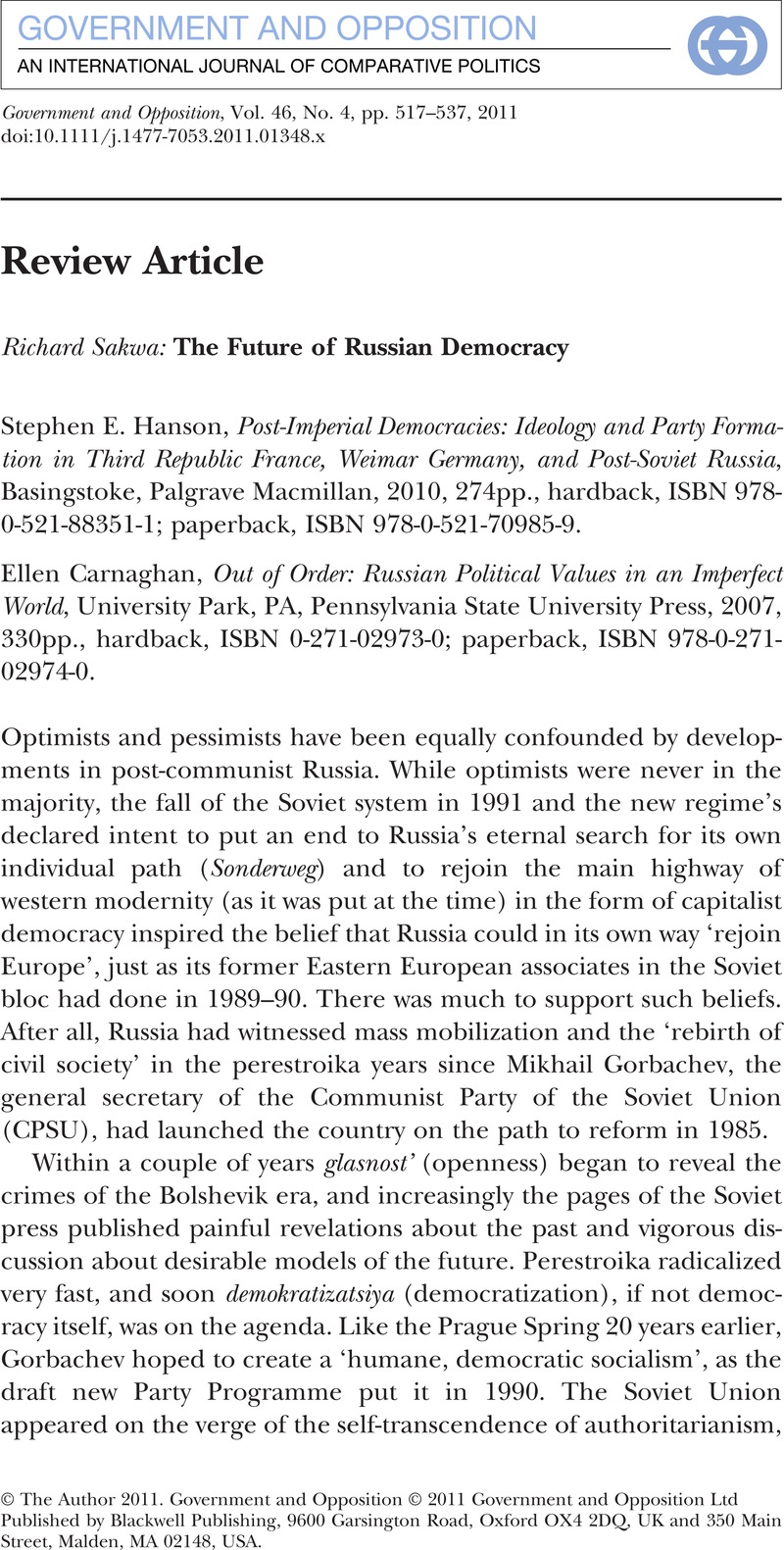Article contents
The Future of Russian Democracy
Published online by Cambridge University Press: 02 January 2013
Abstract

- Type
- Review Article
- Information
- Copyright
- Copyright © The Author(s) 2011.
References
1 Lewin, Moshe, The Gorbachev Phenomenon: A Historical Interpretation, Berkeley, University of California Press, 1988 Google Scholar.
2 Deutscher, Isaac, The Unfinished Revolution, Russia, 1917–1967, Oxford, Oxford University Press, 1967 Google Scholar.
3 An extreme example is Petro, Nicolai N., The Rebirth of Russian Democracy: An Interpretation of Political Culture, Cambridge, MA, Harvard University Press, 1995 Google Scholar. A more cautious yet generally upbeat account is provided by Michael Urban, with Igrunov, Vyacheslav and Mitrokhin, Sergei, The Rebirth of Politics in Russia, Cambridge, Cambridge University Press, 1997 Google Scholar.
4 Fish, M. Steven, Democracy Derailed in Russia: The Failure of Open Politics, Cambridge, Cambridge University Press, 2005 CrossRefGoogle Scholar.
5 Nichols, Thomas M., The Russian Presidency: Society and Politics in the Second Russian Republic, Basingstoke, Macmillan, 2000 Google Scholar.
6 McFaul, Michael, Russia's Unfinished Revolution: Political Change from Gorbachev to Putin, Ithaca, NY, and London, Cornell University Press, 2001 Google Scholar.
7 Richard Sakwa, ‘Two Camps? The Struggle to Understand Contemporary Russia’, Comparative Politics, 40: 4 (July 2008), pp. 481–99.
8 Lukin, Alexander, The Political Culture of the Russian ‘Democrats’, Oxford, Oxford University Press, 2000 Google Scholar.
9 Tsygankov, Andrei P., Russia's Foreign Policy: Change and Continuity in National Identity, 2nd edn, Lanham, MD, Rowman & Littlefield, 2010 Google Scholar.
10 Timothy J. Colton and Henry E. Hale, ‘The Putin Vote: Presidential Electorates in a Hybrid Regime’, Slavic Review, 68: 3 (Fall 2009), pp. 473–503.
11 Stephen E. Hanson, Post-Imperial Democracies: Ideology and Party Formation in Third Republic France, Weimar Germany, and Post-Soviet Russia, Basingstoke, Palgrave Macmillan, 2010, p. xix.
12 Hale, Henry E., Why Not Parties in Russia? Democracy, Federalism and the State, Cambridge, Cambridge University Press, 2006 Google ScholarPubMed.
13 Cf. Wolfgang Merkel, ‘Embedded and Defective Democracies’, Democratisation, 11: 5 (December 2004), pp. 33–58.
14 This is analysed in Sakwa, Richard, The Crisis of Russian Democracy: The Dual State, Factionalism and the Medvedev Succession, Cambridge, Cambridge University Press, 2011 Google Scholar.
15 See Richard Sakwa, ‘The Dual State in Russia’, Post-Soviet Affairs, 26: 3 (July–September 2010), pp. 185–206.
16 Antonio Gramsci, ‘Notes on Italian History’, in Selections From the Prison Notebooks of Antonio Gramsci, edited and translated by Quintin Hoare and Geoffrey Nowell Smith, London, Lawrence & Wishart, 1971, pp. 104–20; see also Cox, Robert W., ‘Civil Society at the Turn of the Millennium: Prospects for an Alternative World Order’, Review of International Studies, 25 (1999), p. 16 CrossRefGoogle Scholar.
17 Carnaghan, Ellen, Out of Order: Russian Political Values in an Imperfect World, University Park, PA, Pennsylvania State University Press, 2007, p. 3 Google Scholar.
18 Ibid., p. 4.
19 Fish, M. Steven, Democracy from Scratch: Opposition and Regime in the New Russian Revolution, Princeton, Princeton University Press, 1995 Google Scholar.
20 Urban, Michael, Cultures of Power in Post-Communist Russia: An Analysis of Elite Political Discourse, New York, Cambridge University Press, 2010 CrossRefGoogle Scholar.
- 3
- Cited by


